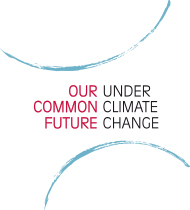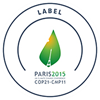�
Our Common Future Under Climate Change
International Scientific Conference 7-10 JULY 2015 Paris, France
Laura Blankenship
Biggest risk of climate change? Failing to take beliefs and values into account
201507-09
By Gwendolyn Blue
Climate change is a game of risk, and the biggest risk is that we might be addressing the wrong problem.�
A common tendency is to approach climate change as a technical problem, such as how to reduce carbon dioxide emissions. Yet, climate change is also an adaptive challenge. This means that we need to take human values and beliefs into account.
This is the key message of Dr. Karen O�Brien�s opening plenary presentation on the second day of Our Common Future Under Climate Change conference.�
O�Brien is a Professor in the Department of Sociology and Human Geography at the University of Oslo, Norway. She is a member of the IPCC Working Group on �Impacts, Adaptation and Vulnerability. Her research examines vulnerability, adaptation and security in the face of global environmental change, with a focus on the role of culture, values and worldviews in social responses to change.�
In her presentation, O�Brien compares old and new games of risk. Old games place a high value on strategizing and competing in order to win. These games are played out in real life as nations compete with one another, for example in the rush to extract oil and gas in Arctic.�
Does this approach help us meet new challenges posed by climate change? According to projected scenarios of the IPCC, if we keep to business as usual, average temperatures will well exceed the threshold of dangerous climate change.�
As temperatures increase, risk increases. Equity is important as risks and our capacity to respond to them are unevenly distributed. Some will be much more vulnerable than others.�
��Our responses to climate change are never neutral� O�Brien emphasizes.�
Personal beliefs matter, yet they are often largely invisible to us. Confronting these beliefs can be uncomfortable and even threatening.�
We also need to call existing political systems into question.�
The social sciences and humanities provide important knowledge for addressing the risks of climate change. Interdisciplinary projects, such as the Future Earth Initiative, are doing important work in this regard.�
O�Brien concludes on an optimistic note: �humans are not just the problem, we are the solution�. Climate change gives evidence that individual acts matter in the context of complex systems.�
An important challenge lies with confronting and changing people�s values and mindsets in line with a more sustainable future. Yet, moving forward is not just a matter of holding hands and cooperating. We need to acknowledge a diversity of values and beliefs as well as raise questions such as which values matter.�
Gwendolyn Blue is an associate professor in the Department of Geography at the University of Calgary, Canada. She is finishing a community-oriented research project in western Canada (Alberta Climate Dialogue) that examines the role of public deliberation in addressing climate change challenges. ��
This is part of a blog series profiling climate scientists, economists, social scientists and civil society members who are presenting and discussing innovative climate science at Our Common Future. For more follow @ClimatParis2015 and #CFCC15 on Twitter.







